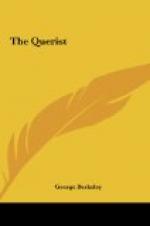84. Qu. Whether there be any difficulty in comprehending that the whole wealth of the nation is in truth the stock of a national bank? And whether any more than the right comprehension of this be necessary to make all men easy with regard to its credit?
85. Qu. Whether any Thing be more reasonable than that the pubic, which makes the whole profit of the bank, should engage to make good its credit?
86. Qu. Whether the prejudices about gold and silver are not strong, but whether they are not still prejudices?
87. Qu. Whether paper doth not by its stamp and signature acquire a local value, and become as precious and as scarce as gold? And whether it be not much fitter to circulate large sums, and therefore preferable to gold?
88. Qu. Whether, in order to make men see and feel, it be not often necessary to inculcate the same thing, and place it in different lights?
89. Qu. Whether it doth not much import to have a right conception of money? And whether its true and just idea be not that of a ticket, entitling to power, and fitted to record and transfer such power?
90. Qu. Whether the managers and officers of a national bank ought to be considered otherwise than as the cashiers and clerks of private banks? Whether they are not in effect as little trusted, have as little power, are as much limited by rules, and as liable to inspection?
91. Qu. Whether the mistaking this point may not create some prejudice against a national bank, as if it depended on the credit, or wisdom, or honesty, of private men, rather than on the pubic, which is really the sole proprietor and director thereof, and as such obliged to support it?
92. Qu. Though the bank of Amsterdam doth very rarely, if at all, pay out money, yet whether every man possess’d of specie be not ready to convert it into paper, and act as cashier to the bank? And whether, from the same motive, every monied man throughout this kingdom would not be cashier to our national bank?
93. Qu. Whether a national bank would not be the great means and motive for employing our poor in manufactures?
94. Qu. Whether money, though lent out only to the rich, would not soon circulate among the poor? And whether any man borrows but with an intent to circulate?
95. Qu. Whether both government and people would not in the event be gainers by a national bank? And whether anything but wrong conceptions of its nature can make those that wish well to either averse from it?
96. Qu. Whether it may not be right to think, and to have it thought, that England and Ireland, prince and people, have one and the same interest?
97. Qu. Whether, if we had more means to set on foot such manufactures and such commerce as consists with the interest of England, there would not of course be less sheep-walk, and less wool exported to foreign countries? And whether a national bank would not supply such means?




